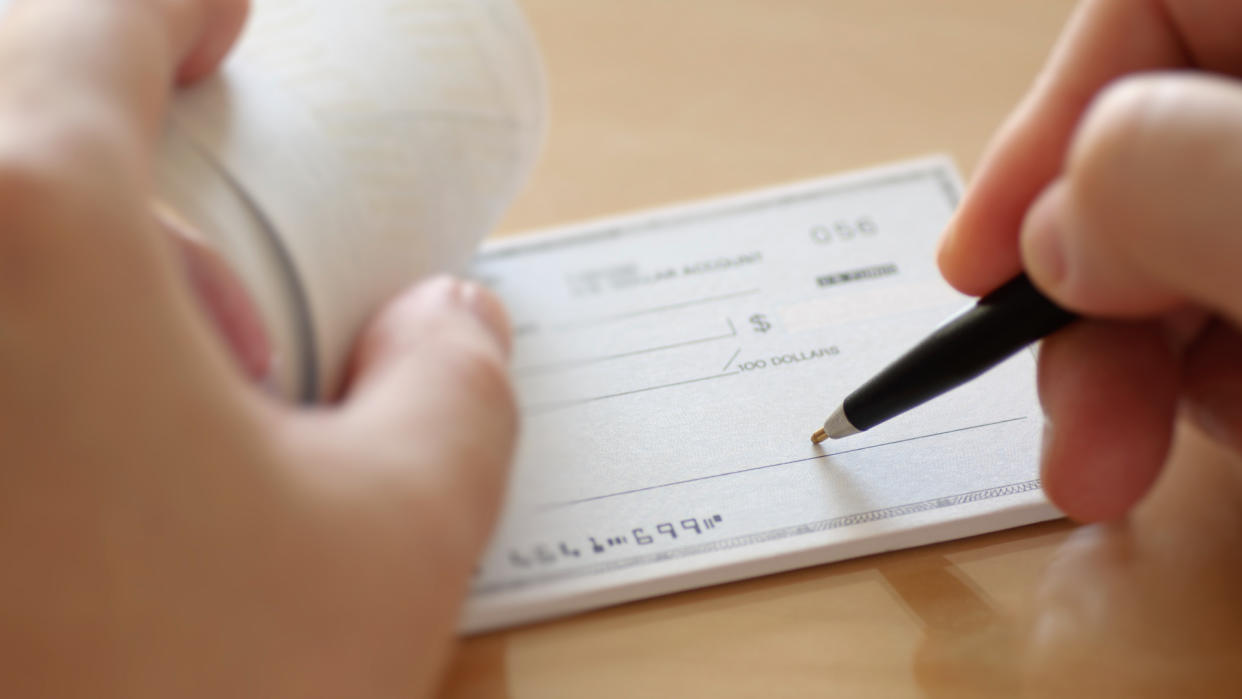How To Sign/Endorse a Check Over to Someone Else

Though handling checks has become less common since the advent of instant cash transfer and payment apps, they still have their uses. Correctly writing and cashing checks continues to be an integral part of managing your finances. And though it happens less frequently than just writing a check, signing one over to someone else is another process worth knowing.
It’s crucial to know how to endorse a check over to someone else, whether you received a check as a gift and want to pass it along or need to pay a third party and only have one made out to you. Keep reading to learn more about how to sign a check over to someone else.
Can I Sign a Check Written to Me Over to Someone Else?
Though it’s not common, you can sign a check written to you over to someone else. This process, sometimes known as third-party endorsing a check, allows you, the initial payee, to make a check payable to another person.
You’ll first need to flip the check over to the reverse side. You’ll usually see a short line or box labeled “endorsement area” or something similar. Sign your name here just as it appears on the front of the check. Right below your signature, write “Pay to the order of” followed by the full name of the person or organization to whom you want to redirect the check.
Not all banks or credit unions take endorsed checks, partially due to the increased risk of potential check fraud. It’s best to contact the bank or financial institution you plan to use to ask if they accept endorsed checks.
Can You Deposit Someone Else’s Check Into Your Account?
It’s possible to deposit someone else’s check into your account. However, it may come with complications due to increased security concerns, as many banks might see this as a potential red flag indicating fraud or other illicit activities.
However, some banks will accept endorsed checks provided you can provide proof of identification or other documentation showing the original check recipient legitimately signed or endorsed the check to you. Generally, you’ll have to sign under their endorsement and deposit as you would normally.
This process can vary depending on your bank’s specific policy. Some might have stricter regulations, requiring the original payee to be present at the time of deposit or asking for additional proof of identification. It’s best to consult your bank about their specific policies regarding depositing third-party-endorsed checks.
How Do I Deposit a Check Made Out to Someone Else?
To deposit a check written to someone else in your account, the original payee must first endorse the check. They can do this by signing the back of the check in the endorsement area and writing “Pay to the order of” followed by your full name as it appears on valid forms of identification.
You would then sign your name underneath theirs and present it to a bank teller for deposit. Remember that you may be required to provide additional documentation, or your bank may refuse to handle a third-party endorsed check entirely.
How Can I Cash a Check That’s Not in My Name?
Cashing a check that’s not in your name may be possible but complex. Many banks will refuse to cash a third-party check to prevent fraud, ensure they don’t transfer funds to an unauthorized person, and keep their customer’s money secure.
Some banks might make an exception if the check was appropriately endorsed to you by the original payee. However, be prepared to show additional documentation or proof that the check is legal, valid and was signed over to you by the original payee in good faith. Consider bringing a signed, dated letter from the original payee or even have them accompany you to the bank.
This is an unusual set of circumstances and might not be the best option. In many cases, finding another way to access the funds represented by the check is probably easier. For example, you could cash it at the original payee’s bank or simply deposit the check and wait for it to clear. If you have no other option, contact your bank directly and ask if they would cash a third-party-endorsed check and, if so, what documentation or proof they might require.
This article originally appeared on GOBankingRates.com: How To Sign/Endorse a Check Over to Someone Else
